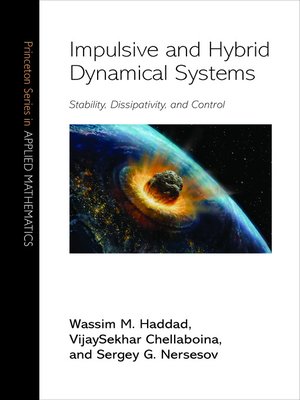Impulsive and Hybrid Dynamical Systems
ebook ∣ Stability, Dissipativity, and Control · Princeton Series in Applied Mathematics
By Wassim M. Haddad

Sign up to save your library
With an OverDrive account, you can save your favorite libraries for at-a-glance information about availability. Find out more about OverDrive accounts.
Find this title in Libby, the library reading app by OverDrive.



Search for a digital library with this title
Title found at these libraries:
| Library Name | Distance |
|---|---|
| Loading... |
This book develops a general analysis and synthesis framework for impulsive and hybrid dynamical systems. Such a framework is imperative for modern complex engineering systems that involve interacting continuous-time and discrete-time dynamics with multiple modes of operation that place stringent demands on controller design and require implementation of increasing complexity—whether advanced high-performance tactical fighter aircraft and space vehicles, variable-cycle gas turbine engines, or air and ground transportation systems.
Impulsive and Hybrid Dynamical Systems goes beyond similar treatments by developing invariant set stability theorems, partial stability, Lagrange stability, boundedness, ultimate boundedness, dissipativity theory, vector dissipativity theory, energy-based hybrid control, optimal control, disturbance rejection control, and robust control for nonlinear impulsive and hybrid dynamical systems. A major contribution to mathematical system theory and control system theory, this book is written from a system-theoretic point of view with the highest standards of exposition and rigor. It is intended for graduate students, researchers, and practitioners of engineering and applied mathematics as well as computer scientists, physicists, and other scientists who seek a fundamental understanding of the rich dynamical behavior of impulsive and hybrid dynamical systems.







